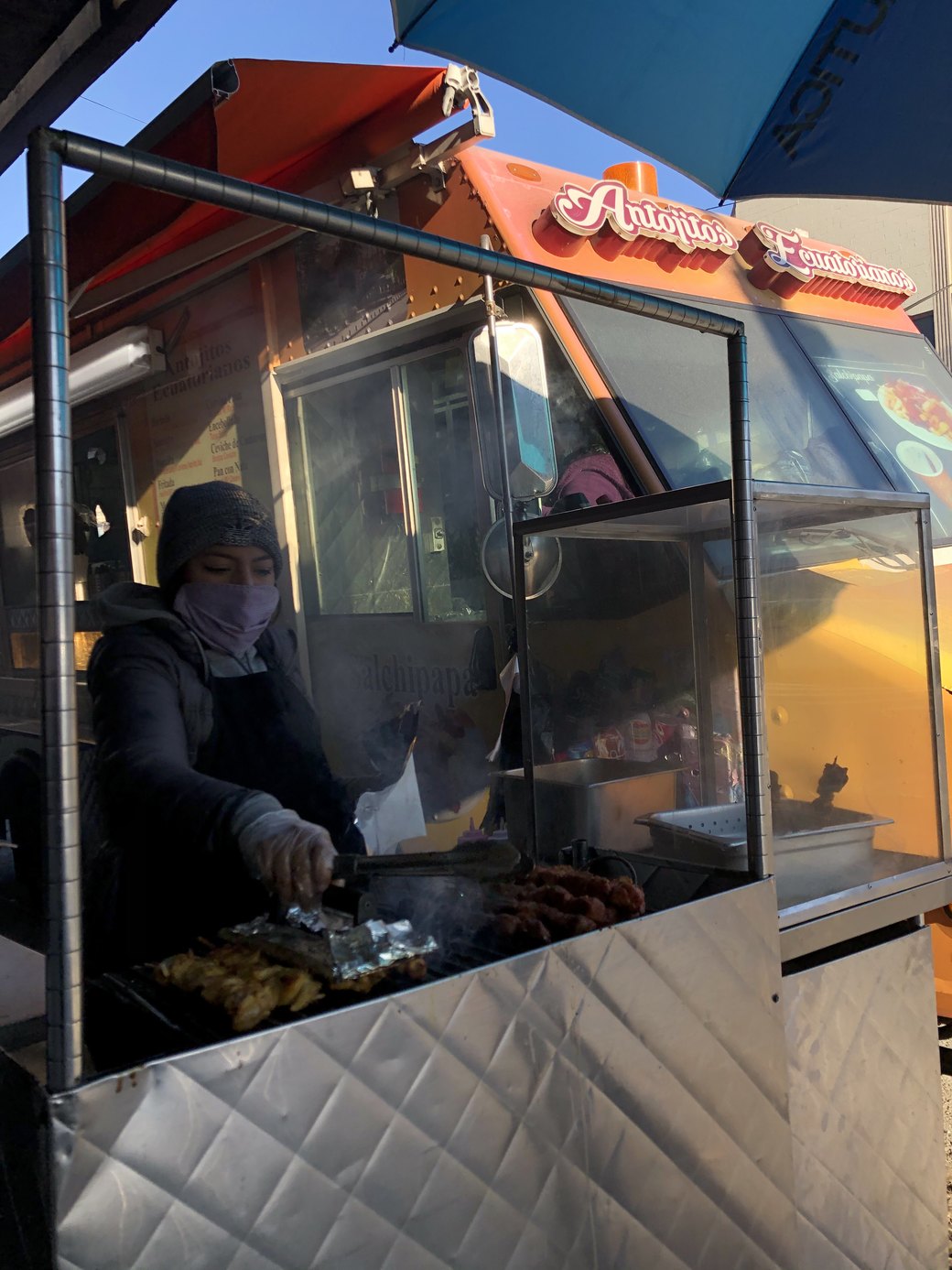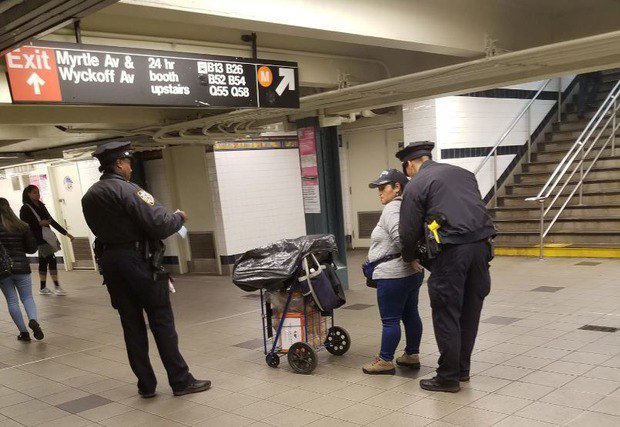Last week, a long-fought-for bill was passed lifting a 40-year cap on street food vendor permits in New York City. The expected result, after gradually paying out about 4,000 new permits over the course of several years, will be an over 100% swell in the amount of street food permit holders in the city by 2032.
The law, spearheaded by Manhattan City Councilwoman Margaret S. Chin, would seem to be good news for many of the city’s undocumented immigrants, who, with little-to-no access to a social safety net, hawk comestibles as a lifeline. But it arrives at a difficult moment for brick-and-mortar eateries and grocery stores impacted by the pandemic — who in fact, formed a coalition back in 2019 that successfully lobbied against an earlier version of the bill.
Street vendors and restaurateurs aside, the bill will no doubt benefit the Bushwick eater, judging by the neighborhood’s already healthy colony of carts and trucks.
But when, exactly, residents of Bushwick will begin noticing an increase in vendor options is difficult to pinpoint. The law doesn’t go into effect until early 2022, and even when it does, the spigot for new permits will be set to a slow drip of 400 per year.

To some, owning and operating a food cart might seem easy, but it’s anything but, especially in New York City. Here, would-be proprietors have long had to stare down the barrel of a merciless black market for permits, itself created by the 1980s moratorium on new permits, which are often bought or subleased from existing owners for rates as high as $25,000. Despite the risk of vehicle impoundment or even jail, there are many vendors, daunted by this formidable monetary obstacle, who choose to operate without permits, bugger the risks.
In spite of the ostensible opposition to the law from restaurant owners, very few negative opinions towards the new law were fielded in Bushwick. A couple of those questioned, in fact, had sprouted their current businesses from the sandy, unforgiving soil of food truckery, and still bear it some affection. One, Gordo’s Cantina co-owner Paulina Loyo-Grigonis, is doubly sympathetic towards street vendors due to her own upbringing in Mexico, where, she says, “anyone is allowed to set up something and try to make a living that way.”
The other, chef and Sweet Chili owner Lisa Fernandes, while also pro-vendor, is more conflicted on the subject.
Fernandes had operated a food truck for five years in New York before opening her own brick-and-mortar on Flushing Avenue last year. She is singularly un-sentimental about the food truck industry, laughing outright when I mentioned Jon Favreau’s food truck fairy-tale Chef.

“Fuck that movie,” chuckled Fernandes by phone. “I mean, I enjoyed it, and I appreciate [Favreau’s] knife skills, and the food looked good, but it’s not like that at all. You don’t drive it across the country; you need a permit for every county you’re in. And you don’t just tweet and have people show up. It’s not that simple.”
“It’s a lot of work. If you’re doing things legally, paying the money for the permit, paying the staff on the books, disability, etc., it becomes expensive and very hard to make money.”
As clear-eyed as she is about the industry, Fernandes recognizes the intrinsic cultural value of a thriving street food scene — even if she dishes out scorn for some practitioners as readily as she praises others.
“I can’t walk to my restaurant without passing, like, twenty vendors!” Fernandes exclaimed. “There’s tamales, ice cream in the summer, different soups and Mexican pastries. There’s even a little cotton candy vehicle, a little baby jeep. They sell cotton candy out the back of it. I love that! And the women with the little grills attached to shopping carts: I think they’re so innovative, so smart and cheap. I see cops buying from them, which makes me happy.”
She paused for a beat, before continuing.
“But I know that when that one hotdog cart rolls away at the end of the day there’s gonna be five Poland Spring water bottles filled with urine sitting there. And those Halal street meat guys: I’ve seen how they operate and it’s absolutely disgusting…There are a lot of street vendors I won’t eat from, because I see what they do.”

Fernandes doesn’t expect the law to magically do away with the street food industry’s problems, such as the issue of hygiene. By her estimation, there are far too many vendors on the streets for even 4,000 new permits to account for, meaning that many vendors will still operate outside the law. And many won’t be abiding by health codes that, while annoyingly strict, do serve the noble purpose of preventing people from wrapping themselves around a toilet bowl in agony for 24 hours.
Among the Bushwick cart owners I canvased for opinions regarding the new law, a placid optimism seemed to prevail, when answers were forthcoming.
A wary young woman manning the perpetually smoke-wreathed grill belonging to Antojitos Ecuatorianos, a stalwart food truck fixture on the corner of Harman and Knickerbocker, said that she thought it was “obviously” a good idea, shrugging away the notion of increased competition to which that the law would eventually give rise.
Another was a bustling, formidable Ecuadorian matron I took to be the boss of tiny tripa-selling cart La Reina del Cisne, right across the street from Antojitos Ecuatorianos. She declined outright, and with palpable suspicion, to answer any questions not related to an eventual exchange of money for food.

Meanwhile, Hernan, a Mexican man who sells maduros and sweet potatoes on the corner of Myrtle and Knickerbocker, answered my questions nimbly and without a trace of distrust. For him, the issue seemed cut-and-dry: more permits equals more work, which equals more cash-in-hand. Even the specter of uncertainty as to how long one might have to wait for a permit didn’t visibly dim his enthusiasm.
Adding to the cost and headaches of owning a food truck or cart are the enforcement tactics of the NYPD, which, by default, disproportionately affect the poor and undocumented vendors unable to hemorrhage the shekels required to be in compliance.
The new bill addresses the issue of enforcement by taking it out of the hands of the police and handing it off to the Department of Consumer and Worker Protection. Over and above street level enforcement, the law also adds an advisory board whose job it will be to gauge the effectiveness of the law’s various regulatory functions.
The question of who will enforce vending in subways — where the police have allegedly taken a special interest in harassing churro vendors — isn’t one that seems to have been addressed in any of the law’s subsections.

Another sub-section addresses the issue of black market permits: it requires that permit holders actually man the vehicle to which their precious document applies, which if effectively enforced, threatens to pull the rug out from under a thriving underground market for permits.
However, a further subsection would give permit holders a full ten years to comply with that particular section of the law. Also, given that there won’t likely be enough permits to satisfy the present demand, a black market may persist anyway.
For many permit owners, their documents serve exactly the same purpose as a real estate, or even more aptly, taxi medallions. Legally iffy though they may be, these permits represent a great financial boon, a method of wiggling one’s way out of the daily grind’s vice grip for members of a societal strata not often able to do so.
But concomitant with black market riches are black market boobie traps, making the case for permit expansion and its accompanying increase in oversight easier to argue. Fernandes herself never fell for any of the black market’s myriad traps, but she knows at least one fellow cook who did.
“I won’t say who, but I know a truck owner who had a permit,” Fernandes recounted. “He went through a broker; you pay him a grand and they find a permit for you for, like, 25,000 dollars.”
“The first time he needed the permit holder to be present, they found out he was deceased for years,” Fernandes said.
In the present moment, so early in the life of the new street vendor law, the one party sure to win out in the end is the customer. There’s currently, to my knowledge, only one al pastor taco stand in the neighborhood, right by the stairs at the Knickerbocker M station (it’s there everyday, from 4 pm to midnight). That’s at least ten carts too few, a tragic scarcity we can all hope the law will eventually address.
Note: A previous version of this story cut out a quote that was later restored. The error has been corrected.
Cover photo credit: Matt Fink
For more news, sign up for Bushwick Daily’s newsletter.
Join the fight to save local journalism by becoming a paid subscriber.





